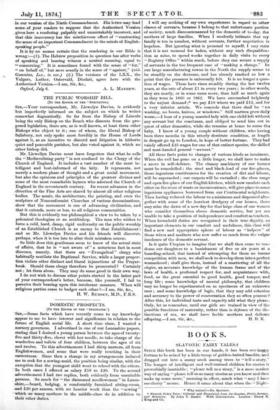THE PUBLIC WORSHIP BILL.
[To THE EDITOR OF THE "SPECTATOR.]
Sin„—Your correspondent, Mr. .Llewelyn Davies, is evidently but imperfectly informed on the subject on which he writes „somewhat dogmatically. So far from the Bishop of -Lincoln being the only Bishop on the Bench who dissents from the pro- posed legislation, there are, as is well known, at least three other Bishops who object to it ; one of whom, the liberal Bishop of ' ,Salisbury, not only, spoke most forcibly in the House of .Lords against it, as an incentive to discord and litigation in hitherto quiet and peaceable parishes, but also voted against it, which no other bishop did.
Mr. Llewellyn Davies must •have forgotten that what he calls the " Medimvalising party" is not confined to the Clergy of •the Church of 'England. .It includes .a vast number of the most in- telligent and best-informed of the laity. It represents, not merely a modern phase of thought and a great social movement, but also the opinions and principles of the greatest divines and -some of the most remarkable laymen who adorned the Church of England in the-seventeenth century. Its recent advances in the .direction of the Fine Arts are shared by almost all other religious ' bodies. The music, • the architecture, the painting, and even the sculpture of Nonconformist Churches of various denominations, show that the movement is one of advancing civilisation, and that it extends, more- or less, to all religious communities.
But this is evidently too philosophical a view to be taken by a. polemical theologian or an archbishop. The man who wishes to force a cold, hard, damp, rigid uniformity on the public worship ' of an Established Church is an enemy to that Establishment ; -and so Mr. Llewelyn Davies and his friends will discover, perhaps, when it is too late •to alter their mistaken course.
So little does this gentleman seem to know of the actual state of affairs, that he is " not aware of " a notorious 'fact in most -dioceses, namely, that there are " Evangelical " clergy who habitually mutilate-the Baptismal Service, •while a larger propor- tion violate other distinct and literal injunctions of the Prayer- -book. Should these clergy therefore be prosecuted? Certainly not ; let .them alone. They may do some good in their own way.
I do not-wish to discuss other points started in the latter part of your correspondent's letter, because, like younself, I fail to perceive their bearing upon this intolerant measure. When will ,religious parties cease to badger each other am, Sir, &c.,
H. W. RUMMY, M.D., F.R.S.


































 Previous page
Previous page